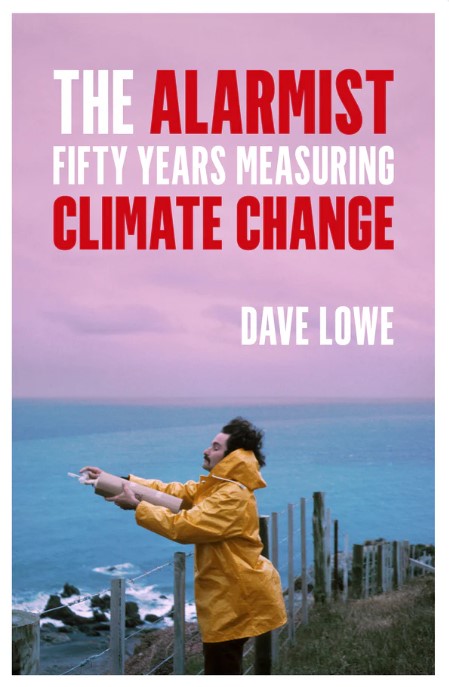
Join Dr Dave Lowe as he discusses the latest climate science and its implications, as well as the impact of new technology and his thoughts on ‘urgent optimism’ – including suggestions of actions that we can all take to reduce carbon emissions.
In the mid-2020s the climate crisis remains the most significant emergency facing humans. But we also face other existential threats including failing democracies, widespread inequality, pandemics and war. As we go about our daily lives in New Zealand it’s difficult to escape dire headlines seeking our attention. Sometimes our anxiety levels over the issues become so high that we simply ‘switch off’. We stop watching television news broadcasts and reading news reports covering the threats and we avoid discussions with our friends about the topics.
Dave Lowe was the first person to make continuous measurements of atmospheric CO2 in the mid latitudes of the Southern Hemisphere over fifty years ago, and has watched in horror as levels of the gas in the atmosphere have climbed at an accelerating rate as we burn increasing amounts of fossil fuels. The science is unequivocal – there is no doubt that we are facing a climate emergency, and we need to act immediately to reduce carbon emissions to prevent the onset of dangerous climate change. But there is also a lot of good news coming from motivated NGOs, interest groups and individuals all over the planet. In many cases their work has spanned decades leading to huge improvements in local environments and wellbeing. Sadly, this news is often not deemed ‘newsworthy’ In comparison global climate change is one shocking major story after another that is usually explained in a few gloomy paragraphs with eye catching pictures of disasters.
Dave will impart his qualified message of hope – while emphasising a call to action!
Copies of Dave’s book The Alarmist: Fifty Years Measuring Climate Change will be available for purchase on the day.
Dr Dave Lowe Adjunct professor Antarctic Research Centre, Victoria University of Wellington, New Zealand | Director LOWENZ Ltd, a small company focused on science education and sustainability | NIWA Emeritus Researcher Atmospheric Chemistry | Visiting scholar, Scripps Institution of Oceanography, La Jolla, California.
Dave Lowe spent his early life in small town, Taranaki, New Zealand in the late 1950s and early 1960s. He grew up surfboard riding there and this led to an early interest in the environmental, atmospheric and oceanographic sciences.
After completing Physics honours and Masters degrees at Victoria University Wellington in 1972 he worked at Scripps Institution of Oceanography in La Jolla, California on a project aimed at the precise measurement of carbon dioxide in the atmosphere. These and similar measurements of methane and other atmospheric trace gases at Baring Head, New Zealand help underpin current international knowledge of the effects of industrial and agricultural impacts on the properties of the atmosphere.
 He spent from 1978 to 1982 in Jülich Germany working on a PhD in atmospheric chemistry at the University of Cologne (grade Magna Cum Laude), a rewarding experience which he credits with changing his life forever. After completing his PhD, Dave worked at several international scientific institutes including the Kernforschungsanlage, Jülich, NIWA in Wellington New Zealand, the US National Center for Atmospheric Research in Boulder Colorado, University of California in San Diego where he is a visiting scholar and for University of Heidelberg’s Institute of Environmental Physics.
He spent from 1978 to 1982 in Jülich Germany working on a PhD in atmospheric chemistry at the University of Cologne (grade Magna Cum Laude), a rewarding experience which he credits with changing his life forever. After completing his PhD, Dave worked at several international scientific institutes including the Kernforschungsanlage, Jülich, NIWA in Wellington New Zealand, the US National Center for Atmospheric Research in Boulder Colorado, University of California in San Diego where he is a visiting scholar and for University of Heidelberg’s Institute of Environmental Physics.
From 2004 to 2007 he was one of two New Zealand lead authors on the United Nations IPCC 4th assessment report on climate change working group 1 “The physical science basis”. For ground-breaking contribution to human knowledge on climate change science, contributors to this report were jointly awarded the 2007 Nobel peace prize.
Dave is now active in a small family company (LOWENZ ltd) specialising in science education. Projects have included driving the research needed by Gareth Morgan for a popular book on climate change, teaching atmospheric chemistry and climate change science and the relevance of renewable energy systems for sustainability. He acted as New Zealand’s science ambassador and coordinator with Germany from 2012 to 2018 promoting a wide variety of bilateral science and engineering projects.
From 2019 to 2024 he has worked on book and documentary film projects aimed at informing the public of his personal experiences and ideas on reducing carbon emissions. His book ‘The Alarmist Fifty Years Measuring Climate Change’ published by Victoria University Press in May 2021, is receiving excellent reviews. It has been promoted at writers’ festivals around New Zealand, is available internationally through Amazon both and won the EH McCormick general nonfiction prize at the 2022 NZ book awards (Ockham’s) held in Auckland in May 2022.
In March 2021 Dave received the ‘Wellingtonian of the Year Environment Award’ for his decades long service promoting public awareness of the dangers of continuing carbon emissions. In November 2021 NZ Geographic released a short documentary entitled ‘Counting Carbon’ with his thought’ on emissions (link here: https://www.nzgeo.com/video/counting-carbon/ ) and in December 2021 Netflix began streaming a four part documentary series ‘Stories of a Generation’ featuring the inspiration provided by the stories of 70+ year olds and their interaction and impact with younger generations – Dave’s story appears in the second episode, ‘Dream’.
During his career as an atmospheric scientist, Dave has personally witnessed a more than 30% growth in atmospheric carbon dioxide driving the current climate emergency.
Above image credit: Cover photograph: Dave Lowe at Baring Head, 1973. Cover design: Keely O’Shannessy.